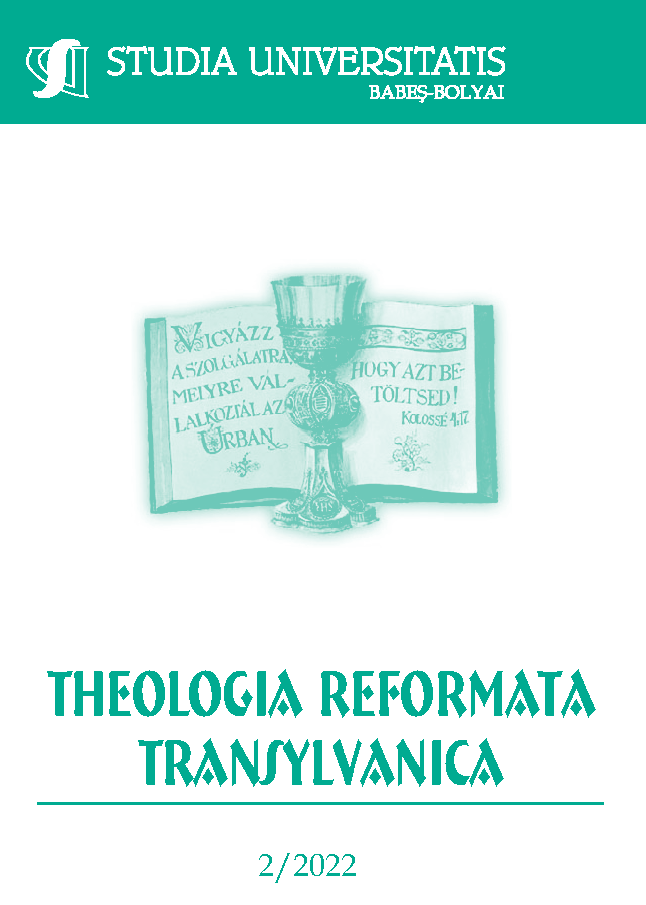Dealing with Guilt in Pastoral Care
DOI:
https://doi.org/10.24193/subbtref.67.2.11Keywords:
relational existence, multiple belonging, heteronomous existence, coexistence as divine discomfort, existential guilt, indebtedness (debitum), actual indebtedness (culpa), order of being, monologic stance, contextual pastoral careAbstract
This study starts from the current experiential reality of the family, described by sociologist Peter V. Zima as follows: The family, as a victim of society as an alienating structure, becomes itself an alienating structure, which makes it impossible to establish intimate and supportive relationships between family members and the future of the family. The family therefore fails to fulfil its original role of being a place of embeddedness and a resource for society. It is also hampered by transgressions while hindering the search for fairness towards each other. Pastoral care can help families to recognize the essence of guilt and then seek effective resources of help. The paper, therefore, highlights the fundamental relational nature of human existence and the existential nature of guilt through philosophical, theological, and biblical anthropology (1). It then highlights the importance of the notion of existential guilt in contextual perspectives, therapy, and pastoral care (2). Finally, following a theological interpretation of the concept of guilt, it identifies in four points the areas in which the use of the concept of existential guilt in pastoral care is helpful (3).References
BARTH, Karl (1948): Kirchliche Dogmatik. III/2. Zürich, Evangelischer Verlag A.G. Zollikon.
BOSZORMENYI-NAGY, Ivan – KRASNER, Barbara R. (1986): Between Give and Take. A Clinical Guide to Contextual Therapy. New York, Brunner/Mazel Publisher.
BOTTERWECK, G. Johannes – RINGGREN, Helmer (eds.) (1986): Theological Dictionary of the Old Testament. Transl. by David E. Green. Grand Rapids, MI; Cambridge, U.K., William B. Eerdmans Publishing Company.
BUBER, Martin (1958): Schuld und Schuldgefühle. Heidelberg, Verlag Lambert Schneider.
(1962): Dem Gemeinschaftlichen folgen. In: Werke I, Schriften zur Philosophie. 454–474.
(2018): I and Thou. Transl. by Gregor Smith, London – New York, Bloomsbury Publishing.
GÜNTHER, Walther (1983): παράβασις. In: Coenen, Lothar (ed.): Theologisches Begriffslexikon zum Neuen Testament. Wuppertal, Theologischer Verlag R-Brockhaus.
KISS Jenő (2020): Hogy az elidegenedettek visszataláljanak önmagukhoz és egymáshoz, In: Studia Universitatis Babeș–Bolyai. Theologia Reformata Transylvanica. 65. 1. 177–198.
KOCH, Klaus: חָטָא In: Theological Dictionary of the Old Testament IV.
KRASNER, Barbara R. – JOYCE, Austin J. (1995): Truth, Trust and Relationship. Healing Interventions in Contextual Therapy. New York, Brunner/Mazel Publishers.
MEULINK-KORF, Hanneke – VAN RHIJN, Aat (2002): De onvermoede derde. Inleiding in het contextueel pastoraat. Zoetermeer, Uitgeverij Meinema.
SEEBASS, Horst (1996): Genesis I. Urgeschichte (1,1–11,26). Neukirchen–Vluyn, Neukirchener Verlag.
VAN RHIJN, Aat – MEULINK-KORF, Hanneke (2001): De Context en de Ander. Nagy herlezen in het spoor van Levinas meg het oog op pastoraat. Zoetermeer, Uitgeverij Boekencentrum.
VANDAMME, Rudy (2013): De Ontwikkelcirkel. Handboek Ontwikkelingsgericht Coachen van Teams. Ramsel, Een uitgave van het Ontwikkelingsinstituut.
ZIMA, Peter (2014): Entfremdung. Pathologien der postmodernen Gesellschaft. Tübingen, A. Francke Verlag.
Downloads
Published
How to Cite
Issue
Section
License
Copyright (c) 2022 Studia Universitatis Babeș-Bolyai Theologia Reformata Transylvanica

This work is licensed under a Creative Commons Attribution-NonCommercial-NoDerivatives 4.0 International License.






